A Regional Leader in Pathology Services, Technology and Experience
By Alex Strauss
Promotional Feature

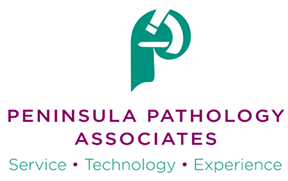 Effective medical care starts with an accurate diagnosis. An accurate diagnosis often begins with a pathology report.
Effective medical care starts with an accurate diagnosis. An accurate diagnosis often begins with a pathology report.
The pathologists of Peninsula Pathology Associates (PPA), one of Eastern Virginia’s leading independent pathology groups for more than half a century, take this responsibility very seriously. With an experienced and accessible staff and a world-class laboratory at Riverside Regional Medical Center in Newport News, the group provides the fast, reliable diagnostic information that local clinicians need, along with a level of focus and personal service that is becoming increasingly difficult to find.
“I have used other hospitals, but I can say without hesitation that I prefer PPA and currently use them almost exclusively for several reasons – I can always talk to a pathologist I know if questions arise, if I want to look at a slide with them I can, their turnaround time is the fastest, bar none; and I doubt any other qroup has their degree of gastroenterology expertise.” – Fred Gessner, MD, Gastroenterology

“PPA is solely focused on our core mission, which is pathology,” says Practice President and Lab Medical Director David Smith, MD, who specializes in genitourinary, breast pathology, and laboratory management. “Although a lot of the national labs are now branching out into other non-core medical industries, here at PPA, we maintain our laser-like focus on pathology.”
Emphasis on Service
The group’s emphasis on establishing and nurturing positive working relationships with the region’s clinicians is another key to PPA’s success.
“Because our group has been in the area for so long, we have a lot of long-term relationships with area physicians,” says Dr. Smith. “We very frequently reach out to physicians and discuss cases with them, particularly if it’s a challenging case. When you are dealing with difficult or unusual findings, being able to make a phone call and establish a local connection makes a lot of sense.”
“We believe that you really need a great relationship with the clinicians and oncologists to get not only the best diagnosis but the best outcomes for patients, all the way from beginning to end,” says Theresa Emory, MD, a nationally recognized expert in gastrointestinal and hepatic pathology.

This emphasis on service for area clinicians means that a PPA pathologist is available for physician consultation 24 hours a day, 365 days a year.
“There are a lot of groups where the pathologists arrive at 9, close their office doors, and leave at 4,” says Michael Schwartz, MD, whose areas of special interest and expertise include head and neck, lung, gynecologic tract, liver, cytopathology and the molecular pathology of solid tumors. “But our doors are open, we are out and about, we are interacting with our clinicians, both in the hospitals and in their offices. PPA pathologists are engaged with clinicians in a variety of settings, including participating in committees with quality improvement initiatives. It is our goal to be out there finding solutions, being proactive.”

Specialty Training
PPA pathologists are uniquely equipped to help find proactive solutions to even the trickiest problems. All members of the group are Board certified (and some are nationally known) general pathologists with extensive additional education and experience in multiple subspecialty areas, giving them a level of additional insight rarely found in private pathology practices.
“Specialization like we all have is unusual for a community-based practice like ours and really makes us unique,” says John Maddox, MD, a leading national consultant in the pathology of asbestos-related diseases and Board certified hematopathologist. “There is a tremendous amount of expertise in the group. Everyone here has had some level of subspecialty training, which is very unusual outside of a university setting.”
“Having a group where everyone has a specialty area of expertise allows us to handle the widest variety of pathology specimens and provide truly comprehensive pathology services,” says Dr. Smith.

World-Class Technology
Also unusual outside of an academic center is a laboratory as extensively equipped as the state-of-the-art laboratory at Riverside Regional Medical Center, medically directed by PPA.
Committed to staying at the leading edge of the technology revolution, PPA has formed strategic partnerships with leading equipment manufacturers including Roche/Ventana Medical Systems that have enabled them to help develop and test new equipment, procedures, and techniques.
“We often have inspectors from university hospitals who rave about our pathology department,” says Dr. Schwartz. “Many comment on how advanced we are in our technology.”
Thanks to their associations with manufacturers of high-end diagnostic equipment, PPA is now a Beta testing site for some of the very newest diagnostic equipment. They are leading the way in developing cutting-edge diagnostics that will have a profound effect on how Barrett Esophagus, a condition associated with cancer whose incidence has risen faster than any other in the last 20 years, will be diagnosed and managed in the future. In addition, PPA pathologists have developed a revolutionary telepathology/digital pathology program to transmit images electronically and view them in high definition.
“It is our goal to be on the forefront of all the diagnostic tools out there and we are very committed to this,” says Dr. Smith.
To support that goal, PPA also maintains a close working relationship with NeoGenomics Laboratories who offer one of the most comprehensive molecular testing menus for cancer. The Mayo Clinic also serves as a reference laboratory for additional high-end diagnostic testing.
Fast, Accurate Results
Even the best diagnostic equipment and top expertise is of little use unless clinicians can be assured of fast, accurate test results. With PPA located right in Newport News, significant time can be saved in specimen transport alone, which can be especially critical when time is of the essence.
“I have been honored to work with PPA for 25 years. There have been great advantages in knowing the expertise and approachability of these local pathologists. When I have clinical questions about results, or even obtaining an opinion concerning patient evaluation and care, they have always been available by phone, email, or by visit to their department. I have the utmost confidence in their services and am grateful for the opportunity to work with this experienced team.” – Stanley Yeatts II, MD, Gynecology
“In some cases, a specimen might arrive in an hour or less,” says Dr. Smith. “Our lab’s turnaround time also beats the large national labs, where a specimen might be one of thousands received on any given day. The speed at which we can give results is just another advantage of working with a group like PPA. The other advantage, of course, is that, if you need to speak to someone about those results, we are just a phone call away.”
Not only are PPA pathologists accessible to clients, but they also pride themselves on learning as much as they can about the individual needs and preferences of the area physicians with whom they work – another trait not found in busy national labs.
“At the end of the day, we realize that we and our clinician colleagues are taking care of people and that is the center of everything we do,” says Dr. Emory. “That drives us to want to have the best technology, the best education, and the best relationships with other doctors.”

Proud Legacy, Promising Future
One name no longer on the list of active PPA pathologists is the late Jacques Legier, MD, a member of the practice from 1963 to 2010 and a prominent name in Virginia’s pathology community. “He was the one who evaluated some of the first mesothelioma cases in this area in the 1960s,” recalls Dr. Maddox. “Even though this is a community hospital, Dr. Legier published dozens of articles.”
Legier’s legacy helped set the bar high for a practice that continues to push the envelope of what a community hospital-based practice can do and be.
In addition to continually updating technology to stay on the leading edge of comprehensive pathology services, PPA has plans to bring on another pathologist, expand services to community based physician offices, and even help raise public cancer awareness.
“One of the things I’m really interested in is colon cancer screening for women,” says Dr. Emory. “I would love to reach out more to women in the community, particularly when it comes to colorectal health.”
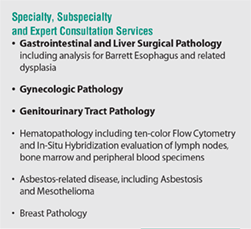 With their focus on the patient as what Dr. Emory calls “the hub of the wheel”, PPA pathologists take a collaborative, team-oriented approach to each case, working closely not only with their clinician colleagues, but also with each other.
With their focus on the patient as what Dr. Emory calls “the hub of the wheel”, PPA pathologists take a collaborative, team-oriented approach to each case, working closely not only with their clinician colleagues, but also with each other.
“After 25 years in an academic surgical practice at the Mayo Clinic, it has been a pleasure working with the PPA physicians. They are a highly skilled group of pathologists, fully informed of current and developing pathologic practice, and readily available for consultation both during an operation and whenever I stop by their offices. I have been very impressed and fully satisfied with their meticulous and prompt pathological services.” – John Donohue, MD, Surgeon
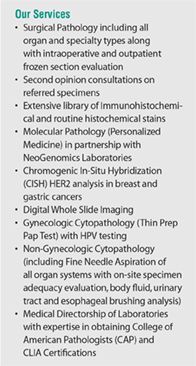 “In some groups, your case is your case, but here, we all have open doors and every day we share cases that are interesting or intellectually challenging,” says Dr. Schwartz. “Everyone here is more than happy to share and look at those cases in order to ensure the best outcomes.”
“In some groups, your case is your case, but here, we all have open doors and every day we share cases that are interesting or intellectually challenging,” says Dr. Schwartz. “Everyone here is more than happy to share and look at those cases in order to ensure the best outcomes.”
“If the patient is at the center of all your decisions, then regardless of how much things change in healthcare, the right outcome will happen,” says Dr. Emory. “That’s the mindset of this practice.
Dr. David Smith can be reached for questions at 757-594-2160, or for more information, please visit ppapathology.com
The Pathologists of Peninsula Pathology Associates:
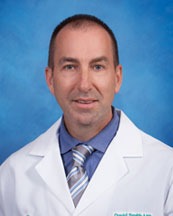 David M. Smith, MD
David M. Smith, MD
Practice President and Lab Medical Director, David Smith, MD, called himself a “Southeasterner, born and raised.”
Board certified in anatomic and clinical pathology, the South Carolina native received his medical degree from the University of South Carolina Medical School and completed his residency in anatomic and clinical pathology at the University of Tennessee.
“I had taken some electives in pathology as a medical student and there was just something about laboratory medicine and the scientific approach that totally captivated me,” says Dr. Smith.
Although he left the area for his pathology fellowship at Washington University/Barnes-Jewish Hospital, he was glad to return to the East Coast 19 years ago to join Peninsula Pathology Associates. Dr. Smith is a published author on prostate pathology, has a special interest in gynecologic pathology, and with his expertise in breast pathology, he helped the hospital win accreditation as a breast cancer Center of Excellence. “Achieving this accreditation required meeting rigorous standards, including the development of a breast cancer biomarker program,” he says. “It is critical that we are standardizing the way these biomarkers are tested so that the results are reliable and reproducible.”
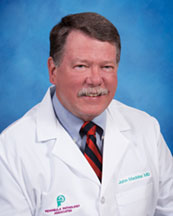 John C. Maddox, MD
John C. Maddox, MD
At 33 years, John Maddox, MD, has the longest tenure with Peninsula Pathology Associates of any of his colleagues.
A native of Charlottesville and a graduate of the University of Virginia School of Medicine, Dr. Maddox is Board certified in anatomic and clinical pathology as well as hematopathology. He completed a residency in pathology at Stanford University, a fellowship in oncologic pathology at MD Anderson Cancer Center in Houston, and a fellowship in hematopathology at MCV/VCU, Richmond before joining PPA in 1982.
“This position at PPA was a cut above all the other private practice jobs available in the five state area in terms of the level of technology available to someone doing anatomic pathology,” says Dr. Maddox.
Although he spends much of his time on bone marrow biopsies, flow cytometry and lymph node biopsies, Dr. Maddox is also a leading national consultant on asbestos-related diseases and consults on about five percent of mesothelioma cases in the US each year.
He is a member of the College of American Pathologists, the Society of Hematology and past president of the Virginia Society for Pathology.
 Theresa S. Emory, MD
Theresa S. Emory, MD
A graduate of the University of Virginia, Theresa Emory, MD, received her medical degree from Eastern Virginia Medical School and completed residencies at the Mayo Clinic, where she was Chief Resident in Anatomic and Clinical Pathology, and Oakland Naval Hospital in California.
Dr. Emory spent six years at the prestigious Armed Forces Institute of Pathology as a Gastrointestinal and Hepatic Pathologist before taking a private practice position in Bristol, Tennessee. She has been with PPA since 2013.
“I was incredibly impressed by the advanced, education oriented, patient-centered approach,” recalls Dr. Emory of her first visit to PPA. “They were performing really top notch immunohistochemistry and molecular testing that we couldn’t in Bristol. Another thing I liked is that they were always looking to advance as medicine advanced.”
Dr. Emory, who says she is “still excited to go to work every day”, is the senior author of the Atlas of Gastrointestinal Endoscopy and Endoscopic Biopsies, written in collaboration with the Mayo Clinic Departments of Gastroenterology and Pathology. Pathologists and gastroenterologists around the country seek her opinions. Dr. Emory is Board certified in anatomic and clinical pathology.
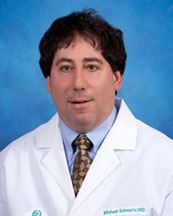 Michael A. Schwartz, MD
Michael A. Schwartz, MD
Board certified in anatomic and clinical pathology, Dr. Schwartz received his medical degree from the State University of New York Health Science Center, Syracuse and completed his residency at the University of Pittsburgh Medical Center (UPMC) where he also served as Chief Resident and Attending Pathologist.
“I received excellent training by some of the best pathologists in the country at UPMC,” says Dr. Schwartz. “At the peak, they were performing 600 to 700 liver transplants a year. We would come in on Monday morning and there would be a stack of livers that had been explanted over the weekend.”
Dr. Schwartz’s areas of special interest and expertise include head and neck, lung, gynecologic tract, liver, cytopathology and the molecular pathology of solid tumors. He spent time at practices in North Carolina and Ohio before joining PPA in 2005.
“As a tertiary care hospital, Riverside runs much like a university hospital. So we see virtually every type of specimen that would be seen at other prestigious medical institutions,” says Dr. Schwartz. “We are fortunate that everyone here has extensive, high-level specialty training.”

